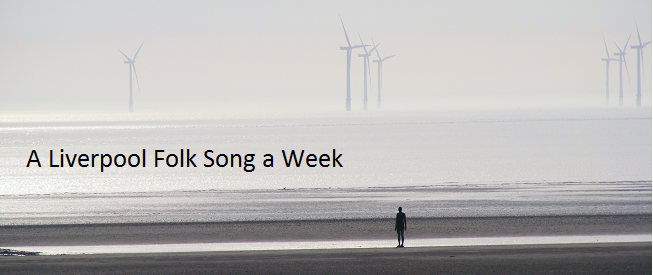This is a song in which a young Jesus Christ gets embroiled in a spot of class warfare; versions have been collected from across England, and particularly in Gloucestershire and Herefordshire, but this version is from Birkenhead. Janet Blunt collected the tune from a Mrs Haigh in 1921, with a fragment of the words; the manuscript is online as part of the English Folk Dance and Song Society's Take Six project. Another slightly more complete set of words is appended from a Miss Baines, also apparently of Birkenhead. Apparently they remembered it as part of the repertoire of street carollers.
Matthew Edwards (now resident on the Wirral and a fount of knowledge about all manner of songs) has done a bit of additional detective work:
I've managed to trace the sisters who gave this song, and two others (A Wassail Song and Christ Was Born In Bethlehem), to Janet Blunt in 1921. They were Annie Beatrice Haigh and Rosamond Kelk, daughters of a bank accountant, who lived in Claughton, Birkenhead in the 1870's. Their father, John William Kelk, was originally from Brigg in Lincolnshire, but both daughters were born in the Wirral.
They told Janet Blunt that they remembered the songs being sung by child waits at Christmas in the streets of Birkenhead 30 or 40 years earlier. Where the songs might have originated is now almost impossible to tell since the population of Birkenhead at that time had grown very rapidly in a short time with the new inhabitants coming from many different parts.
They told Janet Blunt that they remembered the songs being sung by child waits at Christmas in the streets of Birkenhead 30 or 40 years earlier. Where the songs might have originated is now almost impossible to tell since the population of Birkenhead at that time had grown very rapidly in a short time with the new inhabitants coming from many different parts.
The idea of the child Jesus performing a miracle which leads to the death of children who scorn him is an interesting folk survival of an apocryphal tale of the life of Christ; a 1908 article by Gordon Hall Gerould in Publications of the Modern Language Association notes the resonance between the tale and accounts of the boy Jesus in the Gospel of Pseudo-Matthew. As for Mary's administration of corporal punishment to Christ, the curse Jesus administers to the willow branch as it strikes him provides a good explanation of why willow rots from the inside out. (The picture of the willow above, incidentally, comes from a lovely blog about a beautiful garden in Pensby, Wirral.)
The Bitter Withy is #452 in the Roud folksong index.




